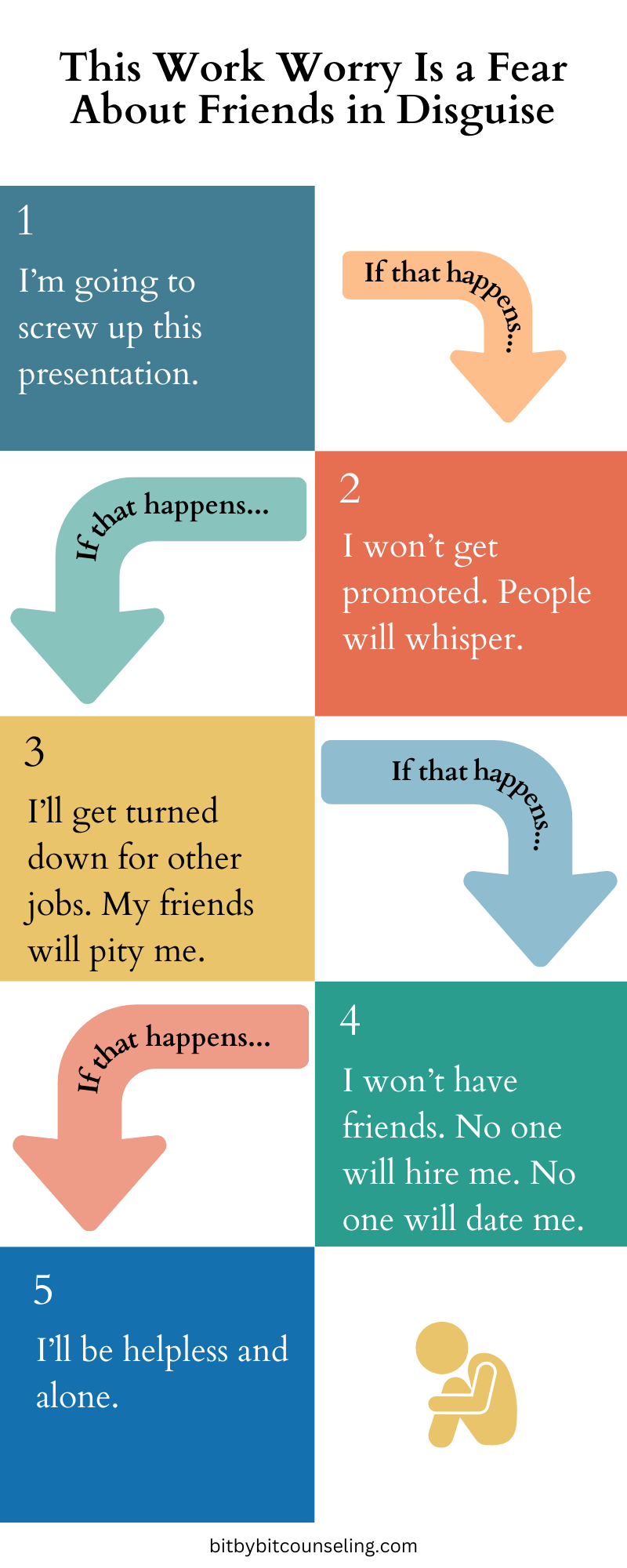Part 1 of Making Friends at Any Age: How to Build Connections as an Adult
“I just want to be part of a group text. I feel like I missed out on that, and now I’ll never have it.”
My client was in her early twenties - so young, right?! But she already felt like she was missing out, and it was too late to have the social life she wanted.
So many of my clients want more or better friendships. Others want to feel more relaxed with the friends they have. It’s been surprising to learn that, whatever is bringing them to therapy, one of the core fears driving that concern is likely to be “I’m going to be rejected.”
Deep Down, How Many of Your Fears Are About Connection?
Most of us have at least a little bit of this fear. It’s as familiar and pervasive as oxygen, so we give it about as much thought. Still, we universally name our relationships the most essential things in our lives. And when we have a fear about something we are aware of, like screwing up at work or getting a bad grade, the reason it’s so scary is that, in the (admittedly unlikely) worst-case scenario, “I’ll be alone.”
If any of that sounds familiar, you’re not alone. With some hard work on your part, it can get millions of times better. It’s shocking to me how many anxieties ultimately connect to some fear like “do I belong?” or “do other people like me?”
The Basic Steps to Making New Friends
Like many of the most annoying problems in life, making lots of friends isn’t complicated. It’s just hard. You already know a lot of the things you’d need to do:
Be around people as often as possible
Be approachable and open to conversation. Start conversations with strangers.
Understand this as a project and not a spontaneous result.
Focus on being interested instead of interesting.
Oh Really?
If it were that simple, you’d have done it by now, right? I wasn’t kidding when I said, “It isn’t complicated; it’s just hard.” And it’s incredibly hard!
The good news AND the bad news are the same thing: there’s way more to it than the list above.
That list covers the basic action steps, but feeling closer and having better, richer connections with friends will be much more likely with a combination of taking action and shifting mindsets.
The Fears
I’ll try to connect with someone, and they’ll turn me down.
I’ve had painful experiences with friends before.
If they see the real me? If I let my guard down? They’ll run. Even worse, they’ll ghost me.
I don’t have many friends now; therefore, I’m not someone people want to be friends with.
I’m a racial, cultural, religious, gender, neurotype, or otherwise minority here, so I’ll never fit in.
I’m not witty enough.
I’m not good enough.
If you’ve ever found yourself in a room full of strangers, and started to get sweaty or shaky or wishing you could sneak into one of the corners, this thought (”I’m not good enough”) has probably been involved. We avoid public speaking, introducing ourselves, or starting conversations in the grocery store. We hesitate to try new things or be vulnerable and honest with important people in our lives. There could be other reasons for avoiding those things, but fear of rejection is the most common!
I still avoid some of those things for the same reason! I’ve improved by leaps and bounds, but I still don’t embrace every opportunity to potentially make an ass of myself. I recently went to karaoke for the first time and sang my heart out for the group songs but passed on holding the microphone every single time. It was an incredibly friendly crowd, and I put a lot of value in being up for that sort of thing, but I still couldn’t bring myself to do it.
“I might be rejected” is still in the mix for me to some degree, and I’m okay with that for now. I still had a blast at karaoke and I think I will make my way to the mic one of these days.
Other Obstacles
There are even more reasons to avoid the checklist of ‘ways to make friends.’ Let’s say we could wave a magic wand and evaporate those fears. There would still be plenty of reasons not to just “be approachable” or start a massive project.
I don’t have time or energy to spend time with the people I already know, let alone meet new ones!
Friendship should happen spontaneously. Working at it just means I’m weird, needy, and defective.
Spending time with people is exhausting. I’m constantly monitoring everyone’s body language, and it’s taxing.
Only deep, meaningful relationships count. Small talk with strangers and acquaintances would be more proof I’m a loser.
Everyone else already has the friends they need - there’s no room for me to join.
Mindset Is the Gold Mine
More than any specific action you could take from the “Making Friends” list, mindset shifts will change…everything.
Imagine what your life might look like if you believed, deep down, with every bone and muscle in your body:
Sure, I’m quirky; sure, I make mistakes, but that describes everybody. Plus, I’m fun to be around!
Every person here has a whole life history I want to know about.
I’m great at small talk.
The more people I know, the more deep friendships I’ll build.
I don’t need to collect friends to prove anything to anyone – including myself.
If someone is upset with me, I know how to navigate conflict and steer us through the discomfort.
Easier Said Than Done, Right?
If it were so easy to change your mindset, we’d all live peaceful, balanced lives! We’d just read some great advice on Instagram and feel instantly transformed.
It is complicated. It’s not as easy as reading a new thought or snapping our fingers. But it’s also not as out of our hands as it feels. According to TV and movies, people can experience dramatic transformation, but only when something big happens. Some life event - often dramatic and painful - interrupts life as usual. In the best-case scenario, a new understanding dawns, and a new perspective takes hold.
We Don’t Have to Depend on Circumstance
It’s not something we learned how to do in school, but it is a skill we can learn.
Every fear on that list above - every fear you’ve had about friendships - was formed by experience. We’re scientists! We’ve been paying attention to the world and noticed that people don’t always get included.
Sometimes, a big group of kids plays together while one kid stands alone at the periphery.
We’ve said something hurtful, intentionally or not, and felt the sting of conflict or rejection.
We formed the deepest of our conclusions when we were kids. They worked reasonably well for a while. And yet! They’re inaccurate and aren’t helping us in a new context. “I’m not good enough” was good at keeping us from swaggering into a room and pronouncing our glory, but now the lack of swagger is holding us back.
Therapy As a Lab
The basic formula for updating our conclusions is to treat the therapy room like a lab where we run experiments. To be effective, we can’t just argue analytically with the conclusions we reached as kids. We already disagree with them on the merits and feel irrational for behaving like we don’t!
Instead, we need to bring the emotion into the present moment – we need to feel the anxiety, the self-consciousness, the anger, the dread - and then use techniques to test our earlier conclusions and disprove them to ourselves.
It sounds complicated, and it is an involved process, but it’s worth learning about. The gist is this: I can intellectually believe a new conclusion, but until I have a new experience that discredits the earlier belief, I’ll still feel like the first one is true.
That is especially true about beliefs with high stakes, i.e., “I better not piss anybody off, or I’ll be an outcast.”
That kind of learning is what happens in the ‘extreme life event’ scenario. Those events transform us because they test our previously held beliefs with new information (i.e., life is highly unpredictable) in the context of intense emotions.
With experiential approaches to therapy, we don’t have to wait, it doesn’t have to be an accident, and it doesn’t need to involve a tragic loss.
Read more about that and the relationship-specific pitfalls of perfectionism in the next post in this series.
Cheryl Delaney, MS, LPC
Cheryl Delaney is a Georgia-based therapist who specializes in helping people overcome perfectionism through online counseling. She’s been a bit of a goofball as long as she can remember. Her approach balances professionalism with warmth, making sessions feel effective and encouraging. When she's not in therapist mode, Cheryl's likely spending time with her husband, three kids, and two cats or absorbed in a podcast while doing the dishes.








